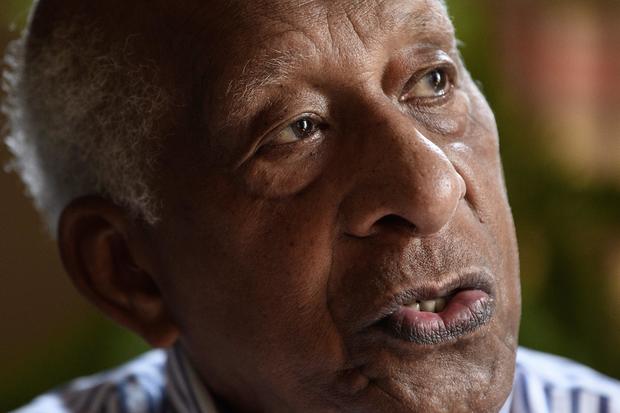Daniel Smith, whose father was born in slavery, dies at the age of 90 after a lifetime of activism
Washington — Daniel Smith, an American civil rights activist and son of a former slave, has died aged 90, his wife told CBS News. Loretta Neumann said Smith passed away at a hospice center in Washington on Wednesday night. She said his daughter April and son Rob were by his side.
Smith's rich life story included escaping the clutches of the Ku Klux Klan in the Deep South, marching on Washington with Martin Luther King Jr., and attending the inauguration of the first Black president, Barack Obama. He also represented a last link to the nation's darkest chapter: his father Abram, born in 1863 in Virginia, was briefly the property of a white man, making Smith just one generation removed from slavery.
Daniel Smith was born in Winsted, Connecticut, on March 11, 1932, the fifth of six children Abram had with his second wife, Clara.
Smith shared his incredible story in February with CBS News' chief legal correspondent Jan Crawford, teller her about the messages he'd heard from his father — a freed slave.
"We are survivors," Smith told Crawford.
His father, Abram, was born into bondage in Virginia in the early 1860s. He was 70 when his youngest son, Smith, was born. Smith recalled to Crawford how his father would tell stories about the inhumanity their ancestors suffered and survived.
"Father said, 'You could hear them screaming and crying at the whipping post,'" Smith said. "But the interesting thing: my father never allowed you to talk negatively about America."
Smith told CBS News that his father believed that in the new America, his young son would have the opportunity to be great.
"He grabbed me and shook me. He said, 'You have nothing to cry about. This is America. We came from the strongest of the strong. We survived the ships,'" Smith said. "He gave me the signal to be strong and to survive."
Speaking with French news agency AFP in 2020, Smith said he was "petrified" that then-president Donald Trump would undo decades of racial progress in the U.S., and he urged the public to support the Black Lives Matter movement.
He remembered facing discrimination from a young age, but still surreptitiously dated some white girls at school - much to the horror of his mother, who feared the worst if their families found out.
After school he was drafted into the army, serving as a medic in Korea. Returning home, he became a hero in 1955 when he dove into a hurricane-swollen river to rescue a truck driver.
Thanks to the military, he put himself through college and was elected student body president by a mixed-race student body. During this period, he also endured a tragedy that would remain with him the rest of his life.
Working at a summer camp, Smith took his young charges to see an old reservoir where he noticed a commotion: a girl had drifted too far and couldn't be found.
She was eventually pulled ashore, and Smith found a clear pulse.
But when he went to begin mouth-to-mouth resuscitation on the girl, who was white, he heard a policeman cry out: "She's already dead!"
Smith realized the cop would rather see her die than be saved by a Black man, and so he stopped.
After graduating, Smith became drawn to the racial activism of the day along with a Jewish friend. In 1963, the pair journeyed to Washington to attend a march. They found themselves standing on the steps of the Lincoln Memorial, where they witnessed King's "I have a dream" speech.
Though he planned to become a veterinarian at graduate school in Alabama, his scholarly pursuits gave way to activism, and he was eventually placed in charge of a civil rights project.
Incensed white supremacists burned his office building to the ground and tried to run his car off a highway until he swung into a gas station full of Black customers, escaping his pursuers.
He settled in Washington in 1968 and began a career as a federal worker, founding a national training program for primary care physicians that runs to this day.
Smith retired in the 1990s. He served as an usher at the Washington National Cathedral, where he met presidents Bill Clinton, George W. Bush and Obama.
In 2006, the cathedral hosted his wedding to Neumann, an environmental activist and longtime federal worker.
